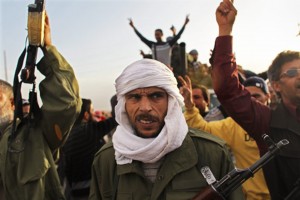Four Outcomes For Postwar Libya
 The Wall Street Journal reports:
The Wall Street Journal reports:
In his address to the nation Monday night, President Barack Obama explained why the U.S. got involved in a military operation in Libya.
What the president couldn't really do—because nobody can—is predict exactly where that military operation will lead. It's an unusual undertaking to begin with, a response to what Mr. Obama called "a looming humanitarian crisis" precipitated by a Libyan leader the president said must leave, but whose departure isn't the stated goal of the military intervention.
That leaves four broad scenarios that could unfold from here, two of them relatively happy ones for the U.S., two of them quite troublesome. The two positive scenarios:
• The Libyan army turns or collapses, and the rebels prevail. This would be the neatest and easiest resolution. The operation by the U.S. and its allies has saved Libya's rebels from annihilation at their last stronghold, the eastern city of Benghazi. Now they've begun to inch back, regaining territory from Libyan troops.
So now, perhaps, some leaders of the Libyan military will conclude that they no longer hold a winning hand, and are destined to go down in the long run with Col. Moammar Gadhafi. President Obama last night virtually invited them to turn on their leader, saying that "it should be clear to those around Gadhafi, and to every Libyan, that history is not on his side."
The problem with this theory is that the Libyan army isn't a very conventional organization, with its most elite forces under the command of one of Col. Gadhafi's sons, who may or may not have been killed in recent days in an attack that may have come from the Western forces, or from a Libyan pilot who crashed his own plane into a command compound. An army's mutiny or meltdown is hard to predict.
• An accumulation of outside pressures forces Col. Gadhafi to leave. This is the scenario U.S. officials embrace openly. The military campaign has stopped the Libyan leader's effort to crush his opponents, this theory holds, buying time for economic sanctions, an arms embargo and complete international isolation to convince him he needs to negotiate a departure.
"We will deny the regime arms, cut off its supply of cash, assist the opposition, and work with other nations to hasten the day when Gadhafi leaves power," Mr. Obama said last night. "It may not happen overnight, as a badly weakened Gadhafi tries desperately to hang on to power."
The promising precedent here is that fear and isolation succeeded once before in compelling Col. Gadhafi to change course, when he chose to give up his weapons of mass destruction in the wake of the U.S. invasion of Iraq. On the other hand, the problem is that Col. Gadhafi and his sons, who share power with him, have behaved in recent weeks as if they believe that, unlike Egypt's Hosni Mubarak, they must either prevail in the current confrontation or perish.
Now, the two more troubling scenarios:
Click here to read more.

